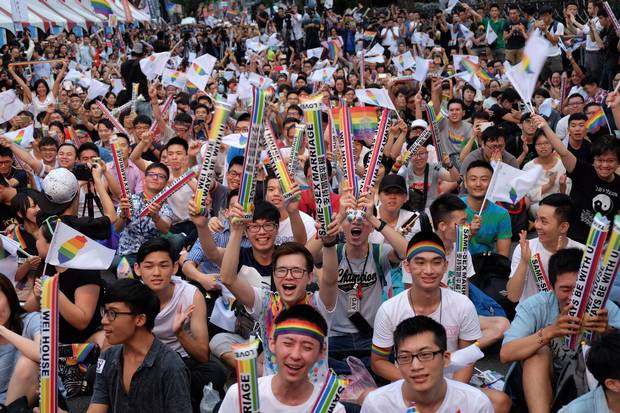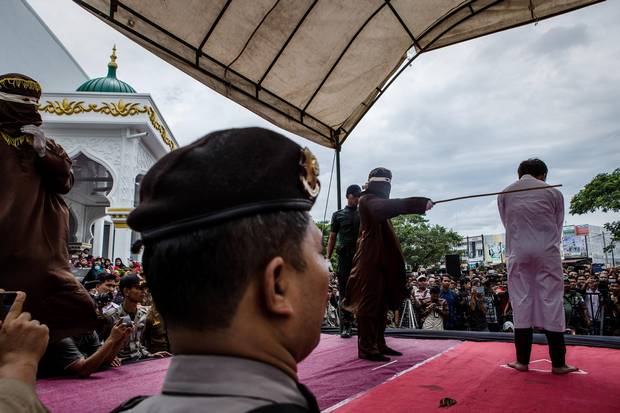On Thursday, the Canadian Senate passed Bill C-16, which protects Canadians from discrimination based on gender identity or expression, establishing Canada once again as a global leader in advancing LGBT rights.
A few hours earlier, T. Nhaveen died in a Malaysian hospital. Several days before, the 18-year-old student had been set upon by several youths who considered him effeminate. They beat him, burned him with cigarettes, and sodomized him with a blunt object. By the time he received medical treatment, he was brain dead.
We are witnessing a global – yet very local – phenomenon: As LGBT rights advance in parts of the world, a backlash appears to be developing in other parts. Last month, a court ruling made Taiwan the first Asian country where same-sex marriage will be legal. Also last month, Indonesian authorities caned two men 83 times in public because they had been caught having sex.
With the United States under Donald Trump no longer interested in advancing human rights, it falls to Canada and its allies to promote and defend those who face persecution because of how they identify and whom they love.

Crowds of pro-gay marriage supporters in Taiwan on May 24, 2017, cheered, hugged and wept as a top court ruled in favour of same-sex unions.
Sam Yeh/AFP/Getty Images
The Senate approved Bill C-16, which prohibits discrimination based on gender identity and gender expression, by a vote of 67 to 11. Conservative senators had delayed and tried to amend (read: weaken or gut) the bill but, in the end, it passed intact, supported both by former Liberals and by the new independent senators appointed by Justin Trudeau.
Passage of the legislation "marks a significant step toward recognizing transgender and gender diverse communities as worthy of dignity and respect," said Helen Kennedy, executive director of Egale, which advocates for the LGBT community. "I'm grateful to everyone through the decades who fought tirelessly to get us to this historic moment."
It has been a long road, one that included several failed attempts through private-members' bills. This time, C-16 had the full weight of the Trudeau government behind it. Although Conservatives fought the bill in both houses – "There are many people in this country who do not believe that a transgendered lifestyle is God's plan or that it is medically beneficial," explained Marilyn Gladu, MP for Sarnia-Lambton – the Liberals made it clear they would impose closure, if need be, to get the bill through. With the summer recess mere days away, the opposition bowed to the inevitable and allowed third reading to proceed.
With royal assent, gender identity will be protected from hateful acts or words throughout the land – a fine 150 th birthday present for Canada to give itself.
It has taken decades for some nations to legalize homosexual acts (usually in the 1960s), advance equal rights for homosexual couples (often in the 1990s) and recognize same-sex marriages (the Netherlands was the first, in 2000). More than 20 countries sanction homosexual marriage today; their diverse ranks include South Africa and Uruguay. Chile is likely to be next.

An Indonesian man is caned in public for having gay sex, which is against Sharia law, at Syuhada mosque in Banda Aceh, Indonesia on May 23, 2017
Ulet Ifansasti/Getty Images
But in more than 70 countries, homosexuality remains a crime. And public pogroms are disturbingly common. European governments are offering refuge to Chechen men who have been forced to flee the Russian republic after local authorities began rounding them up and subjecting them to detention and torture.
"We're seeing some inevitable backlash, and that backlash is often violent, is often mixed up with nationalistic fervour and economic unease," observes Mark Bromley of the Washington-based Council for Global Equality, which advocates for U.S. leadership in promoting LGBT rights around the world.
The backlash may have populist or religious elements; it may be whipped up by a political leader seeking to distract the population from its misery.
"There are a variety of reasons, and it's different in every context," says Jackie Hansen of Amnesty International Canada. "But regardless of the reasons why it's happening, what is happening is that the LGBT community is scapegoated."
Under former president Barack Obama, the United States promoted human rights internationally, including rights for sexual minorities. But President Donald Trump has made it clear human rights are not on his agenda.
"We are not here to lecture," he told the leaders of more than 50 Muslim countries in Saudi Arabia last month. "We are not here to tell other people how to live, what to do, who to be, or how to worship." With this President, countries that co-operate with the United States, especially in the fight against terrorism, need not fear censure over how they treat their own populations.

People march during the annual Toronto Pride Parade, in Toronto on Sunday, July 3, 2016.
Mark Blinch/The Canadian Press
These and other actions caused Canadian Foreign Minister Chrystia Freeland to declare last week: "The fact that our friend and ally has come to question the very worth of its mantle of global leadership puts into sharper focus the need for the rest of us to set our own clear and sovereign course." That course includes promoting LGBT rights around the world.
Earlier this month, Canada announced it will assume the role of co-chair of the new Equal Rights Coalition. Founded last year, this network of more than 30 nations seeks to promote and protect the rights of LGBT citizens around the world.
Canada also promotes the extension of human rights for sexual minorities within the Commonwealth. Thirty-six of its 52 members criminalize homosexual acts. The Liberal government successfully supported the accreditation of the Commonwealth Equality Network, an organization of groups advancing LGBT issues, as a Commonwealth institution.
But Canada must approach LGBT issues, in the Commonwealth and elsewhere, with discretion. The best way is often to support the young men and women who advocate – often at great risk – for their sexual rights in countries where they lack those rights.
"We encourage the Canadian government to listen to the voices on the ground and follow their lead in terms of what advocacy approach Canada can take to protect LGBT communities," Ms. Hansen said.
Ultimately, defending LGBT rights embeds "the idea of the individual and individual rights over the body and sexuality," says Graeme Reid of Human Rights Watch. Backlashes against such rights "become a sort of shorthand for traditional values, or the idea of this pristine past that, of course, never existed. But it's easy to appeal to that." This, then, is a struggle for the modern, the global, the individual, against the past, the parochial, the collective.
Canada has an opportunity to lead the effort to persuade world leaders that they need not fear the rights of their citizens to live their lives as they choose, including in how they express their sexuality and gender. Because it's 2017. Everywhere.
People carry an oversized rainbow flag down Robson Street during the Vancouver Pride Parade on Aug. 3, 2014.
DARRYL DYCK/THE CANADIAN PRESS
The long road to equality
Many bills have been debated in the House of Commons over the past 12 years that sought to make "gender identity or expression" prohibited grounds for discrimination. Bill C-16, which cleared its final vote in the Senate on Thursday, is the first of these bills actually to pass all the legislative hurdles. The legislation now awaits royal assent by the Governor-General to become law in the coming days. This is a brief history of its precursors.
2005: New Democrat MP Bill Siksay of Burnaby, B.C., introduces a private member's bill to add "gender identity or expression" to the protected classes in the Canadian Human Rights Act. The bill never makes it past its initial introduction in the House.
2006: After Stephen Harper's Conservatives win a minority government, Mr. Siksay reintroduces his bill, along with a second one that adds gender identity to hate-crime provisions of the Criminal Code. Neither makes it past their introductions.
2009: Mr. Siksay combines both bills into one and introduces it after the 2008 election. The bill makes it through a narrow vote in the House of Commons – with Liberals, NDP, Bloc Québécois and a few Conservatives in support – in 2011, but does not get anywhere in the Senate before the election is called that spring.
2011: Mr. Siksay chooses not to run in the election, in which the Conservatives win a majority. A fellow New Democrat MP from B.C., Randall Garrison, picks up the baton and reintroduces the bill in 2011, which must start the legislative process from scratch. Two years later, it clears the House, again with the support of some Conservatives. The bill stalls in the Senate, despite a renewed push in early 2015 to get senators to deliver a final vote on the bill. It dies when an election is called in the summer.
2015: Mr. Garrison reintroduces the legislation, which must again start the process from the beginning. The newly elected Liberal government signals its support and introduces its own version of the bill, which can move through the legislative steps more quickly.
2017: The Senate passes Bill C-16 on June 15.